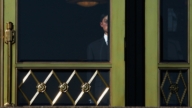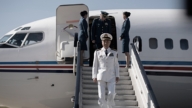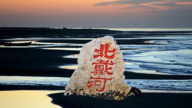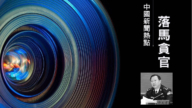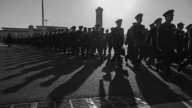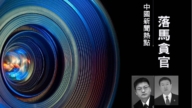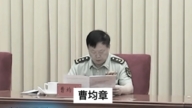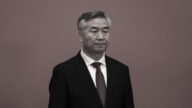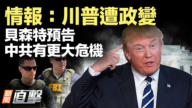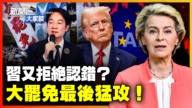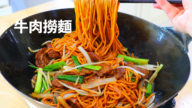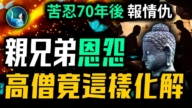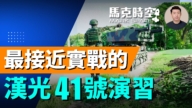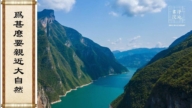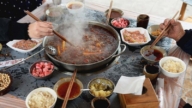【新唐人2012年12月24日讯】中共新总书记习近平从前任胡锦涛手中,接掌中央军委之后,首次出招治理军队。最近,他以军委主席身份对军方高层发出所谓的“十大禁令”。其中要求军头下部队轻车从简、严禁宴请、喝酒等。习近平更借机加强对军队言论的控制。报导说,“十大禁令”间接反映习近平不满前任的江泽民和胡锦涛治军不当,导致军中腐败日益严重,想藉由治军来“立威”。但中共军队的腐败会因此改善吗﹖下面来听听专家的分析。
中共中央军委最近对军方高层发出的“十大禁令”,全称为“中央军委加强自身作风建设十项规定”。
规定重申,“军头出行”要简化迎来送往、严控警车开道、禁止私下出席庆祝会、纪念会、表彰会等﹔禁止参加接见照相、颁奖、剪彩、奠基、揭幕等活动﹔禁止发贺信、贺电﹔不题词、题字﹔禁止个人发表涉及重大敏感问题的讲话和文章﹔还有,除中央和军委统一安排外,个人不公开出版著作等。
其中禁止题词、题字的禁令,被指为影射江泽民。
而对军头下基层,则列了12个“不”字:不张贴悬挂标语口号,不插彩旗,不修建参观台,不组织官兵列队迎送,不铺设迎宾地毯,不摆放花草,不组织专场文艺演出,不安排宴请,不喝酒,不上高档菜肴,不送纪念品,不安排住地方宾馆,住招待所不增配高档生活用品。
据报导,这是中共军方高层第一次宣告“禁酒”。
这“十大禁令”与政治局会议首次出台的“八项规定”,似乎大同小异,但更为具体详尽。旅美“哥伦比亚大学”政治学博士王军涛表示,“十大禁令”是习近平告别江泽民和胡锦涛时代那种讲假话、大话、和空话的花架子作风。
旅美“哥伦比亚大学”政治学博士王军涛﹕“第一点就是说,他们想和历史划清界线,那是因为他们抓不了大事,只好抓小事,大事就是我们讲的临政的改革、平反六四、调查对各种各样的政治迫害案,像法轮功、民主党的迫害案,这事不能做。第二,他们在这种小破事上提的要求,又显得小儿科﹗是那种连小学辅导员对小学生都不会提的。”
《规定》最后明订军队“决不谋私利,绝不搞特权”,要求军委带头反腐败,以身作则,严格执行住房、车辆配备等规定﹔严格管好配偶、子女和身边工作人员,不接受礼品、礼金和有价证券﹔公道选人用人,不插手下级官员任用,坚决抵制跑官要官﹔不插手干预工程建设、装备采购、军用土地处置等事项。
但,政治评论家文昭表示,大陆的军队,相较于其他系统封闭性更强,内部具体的腐败情况,外面只能靠耳闻传说。而且军队可以用“军事机密”加以掩盖,可以通过军事法庭独立审判,因此社会对军队的了解比较少。
政治评论家文昭﹕“他(军队官员)搞一些基建项目、土地审批,就是通过这些项目来收受贿赂。还有就是利用一些军事运输工具,比方说…这个事情在90年代就是存在的,就是,比如说在海军,搞一些演习,画定一些演习区域,然后利用军方船只走私一些高档汽车、手表、名牌服装。再比如说,军队里面中基层的官员,利用倒卖战备物资等等这种方式来获取利益。”
文昭还提出,军队的这十大禁令,并没有提到一旦违反时会如何处理﹖因此文昭认为,很难预期这些规定会有持久的约束力,可能在风头上抓一抓,过一段时间以后又会恢复到原来那样子﹗
采访/梁欣 编辑/周平 后制/君卓
Xi Jinping’s “Ten Prohibitions” for the Military
The new Chinese Communist Party (CCP) secretary general
Xi Jinping made moves in the military administration, after succeeding Hu Jintao as the new military leader too.
Recently, Xi released the so-called “Ten Prohibitions”
towards the high military commanders
In his order, Xi required them to refrain from costly actions
at troop inspection, and bans luxury receptions and liquor.
In addition, Xi attempts to strengthen the control
over speeches, given in the army.
Reports remarked that the prohibitions indirectly reflect
Xi’s dissatisfaction with the increasingly serious corruption problem in the military under Jiang and Hu’s ruling.
Therefore he intends to establish his personal authority
by issuing administrative commands.
However, analysts doubt that Xi’s efforts can make
any real improvement.
The CCP’s Central Military Commission (CMC) had issued
“Ten Prohibitions” to the high-level military officers.
The full name of the document is,
“CMC’s Ten Provisions for Behavioral Self-Improvement.”
“Ten Prohibitions” require military heads to cut needless
social activities and strictly control the use of police escort.
It bans attending ceremonies of photographing, awarding,
ribbon-cutting, foundation laying, unveiling, etc.
It also bans issuing congratulatory letters or messages,
writing inscriptions and privately presenting speeches or publishing articles on major sensitive issues.
In addition, nobody is allowed to make personal publications
without permission of CCP’s Central Committee or the CMC.
It is believed that the ban on personal inscriptions
is directed against the ex-leader of China, Jiang Zemin.
Meanwhile, twelve “No’s” are listed in regulating activities,
when military heads inspect troops of primary levels.
They are: No slogan posting; No Buntings;
No construction of visiting stations;
No welcome or farewell protocol’ parades;
No welcome rugs; No flower decorations;
No special art performances; No reception banquets
and liquor; No luxurious food service;
No gift giving; No accommodation in local hotels;
No high-end living supplies in lodging rooms.
It is reported that this is the first ban on liquor
against CCP’s military heads in its history.
The “Ten Prohibitions” look similar to the “Eight Provisions”
issued by the CCP’s new politburo, but with more details.
Dr. Wang Juntao, political scientist at Columbia University,
spoke about the “Ten Prohibitions.”
Dr. Wang remarked that Xi released them as a farewell
to the hollow show-off manner with big and empty talks,
that spread widely under Jiang Zemin and Hu Jintao’s rule.
Dr. Wang Juntao (political scientist, Columbia University):
”First of all, they (Xi Jinping and followers) intend to draw a clear line between the previous leaders and themselves.
Since they don’t want to touch big issues,
they have to deal with small ones instead.
What I call big issues” refers to political reform,
rehabilitation of the June Fourth Incident victims,
investigating unjust political persecutions like those
against Falun Gong practitioners and dissidents.
They don’t want to touch these big problems.
On the other hand, their requirements on those small
issues like mannerism look just so naïve.”
At its end, the “Ten Prohibitions” requires the army
to never “act to benefit itself,” or “to pursue privileges.”
Specifically, the military leaders are required to “become
examples of anti-corruption,” “strictly abide by rules in housing and car allocation,”
“refuse presents, cash gifts and securities,” “be fair in
personnel arrangement,” “never interfere with appointment of lower-level officials,”
“reject trade of official positions,” “never interfere with
construction projects, equipment purchases and land disposal,” among others.
However, political commentator Wen Zhao thinks
that China’s army is even more secretive.
Its internal corruption can only be known by the public
through rumors.
Furthermore, the army has the cover of “military secrets,”
and can have independent trials in military courts.
Overall speaking, the public knows very little
about the military.
Wen Zhao (political commentator): “Military officials can
accept bribes via infrastructural projects or land approvals.
They can also make profits by military means
of transportation which can be traced back to the 1990’s.
For instance, the Navy can cordon off an area for ‘practicing’
and use military vessels to smuggle luxury cars, goods, etc.
Another example is, top army officials can make money
with their political connections, or war assets, etc.”
Wen Zhao further remarked that the “Ten Prohibitions”
do not mention how will the violators be punished.
Thus he believes the effect of new bans won’t be for long,
and the old habits would be back soon after.


